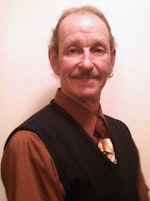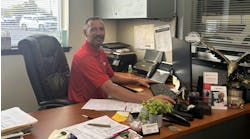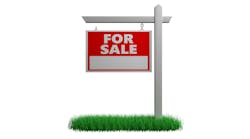"My wife and I have been all over the country," Steve says. They visit other body shops, manufacturers' headquarters and training centers along with attending all manner of educational sessions and industry gatherings wherever they may be.
"It's easy in a town of 800 people to get stagnant, and that's not where I wanted to be," Copeland says. It began at a jobber store in Des Moines that was hosting a program by consultant Mike Anderson. "Mike said, 'You want to work on your business, not in your business.' I was always out in the shop working and we were just spinning our wheels – the light clicked."
At Anderson's invitation the couple traveled to Florida for a 20 Group meeting, starting a steady quest for consistent improvement.
After posting sales of $700,000 in 2009, the company rose to a 2010 figure of $1.2 million. The achievement is attributed to a doubling of the shop's square footage, "putting the right people in place," implementing standard operating procedures to cycle the cars through more efficiently and following best practices as articulated through Anderson's DuPont Business Council 20 Group.
"We have a tight-knit group that does a wonderful job communicating and holding each other accountable," Copeland says.
For 2011, Copeland has a goal of shaving the average cycle time down to four days from seven.
"Remember, if you don't measure it you can't manage it," he says. Understanding the company's financial situation was key to embarking on a successful improvement program, he says.
"We, like so many small business owners, flew by the seat of our pants, not ever knowing where we stood financially." Anderson "basically had to take us under his wing and start from the beginning" with help from the other 20 Group members. A "painful journey" commenced as they tackled 32 "steps to clean numbers."
"This was extremely intense; lots of sleepless nights and many questions," says Copeland, who also credits an accountant on staff as a 20 Group colleague who acts as "a third set of eyes" for looking over the books.
The company strives to continually cut waste and any unnecessary steps, trying to be proactive rather than reactive.
"We have had the opportunity to visit Aaron Marshall's shop in Waukesha, Wis.," Copeland recounts. "I was blown away by their thought processes. We have implemented several lean initiatives such as point-of-use carts, 100 percent teardown, designated stalls for certain operations and monthly continuous improvement meetings with all employees. We constantly are looking for new and improved ways to accomplish our goals."
Drawing from a 30-mile radius around Hedrick, the company airs radio spots and cable television advertisements. "We thrive on referrals," he says, citing stellar customer service index (CSI) scores. "Another thing that's huge is that we help out at our local schools."
Copeland appears to be a human dynamo as he serves on the local school board and is chief of the fire department. At school sports events his shop distributes T-shirts, small footballs and water bottles – all affixed with the company name and its contact information.
"It's mostly kids' stuff, but you go to the games and you see the athletes using our water bottles and wearing our T-shirts."
A customer appreciation day cookout is held and the company has a gift certificate program for customers who make referrals, among other ongoing promotions.
"Holly and I have had the fortune to be able to surround ourselves with good, honest hardworking people," Copeland says. "One of the largest hurdles we have faced is not falling into the small town mentality of 'that doesn't pertain to us,' or 'why do we need to do that?'"
He notes that "one of the biggest keys to our success, I believe, is that we have the luxury of being able to take the time to have a good dialogue with our customers. By this I mean that we can thoroughly explain the repair process."
Customers with questions are shown, "without sounding pushy," an example of a blend panel, provided details about hidden damage and the teardown process.
"We work hard at making sure our customers have a full understanding of what is taking place and why. We hand them a business card at drop off with an expected delivery date. We keep them informed throughout repairs by e-mail, texts or phone calls."
The company's sales closing ratio is a staggering 98 percent; it currently participates in four insurer direct repair programs (DRPs). "We try to do a good job at having open lines of communication with them," Copeland says. "They're impressed with some of the quick procedures we've done, the quick teardowns and the standard operating procedures we have."
When payment questions arise "we can take them out to the shop and show them," he says. "It's a two-way street – we treat people like we'd like to be treated."
Cycle time averages four days or less on DRP cars. "Non-DRP cars take longer because we have to wait on adjusters in our rural area," Copeland says. "Correct and accurate parts orders are crucial because of vendors' distance."
Planning is under way for an eventual shift to waterborne paint along with debuting an Internet site and Facebook presence.
Copeland Auto Body was officially established in 1994 after a longstanding legacy of conducting informal repairs. "My grandparents farmed, and going through the Depression my grandpa always fixed everything instead of buying something new."
Steve embraced that mindset along with a strong sense of enjoyment that came from tinkering. He started rebuilding cars while in college, eventually constructing a 40- by 50-foot garage to pursue the hobby.
"I had a full-time job as a shift manager at a large Iowa-based grocery store. My need to become an independent business owner finally got the best of me along with my love to fix things," Copeland says. "I had been working on other people's cars on my days off along with rebuilding some wrecked vehicles to sell. In 1994 I hired a painter and began my education at the school of hard knocks."




